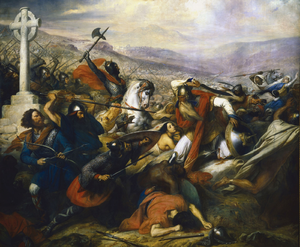Battle of Tours
| Battle of Tours | |||||||
|---|---|---|---|---|---|---|---|
| Part of the Umayyad invasion of Gaul | |||||||
 Charles de Steuben's Bataille de Poitiers en octobre 732 depicts a triumphant Charles Martel (mounted) facing 'Abdul Rahman Al Ghafiqi (right) at the Battle of Tours. The Celtic Cross in the background is an anachronism, such crosses being unknown at the time in the environs of Tours. |
|||||||
|
|||||||
| Belligerents | |||||||
|
|||||||
| Commanders and leaders | |||||||
| Abdul Rahman Al Ghafiqi † | |||||||
| Strength | |||||||
| Varying estimates 15,000–20,000, although other estimates range from 30,000 to 80,000 |
20,000–25,000. Other estimates also range up to 80,000, with 50,000 not an uncommon estimate. Arab sources: about 50,000 in the beginning of the campaign. |
||||||
| Casualties and losses | |||||||
| Estimated 1,500, although sources unclear | Estimated 12,000, although sources unclear. Most notably Abdul Rahman Al Ghafiqi. | ||||||
20,000–25,000. Other estimates also range up to 80,000, with 50,000 not an uncommon estimate.
The Battle of Tours (10 October 732) — also called the Battle of Poitiers and, by Arab sources, the Battle of the Palace of the Martyrs (Arabic: معركة بلاط الشهداء, translit. Ma'arakat Balāṭ ash-Shuhadā’) — was fought between Frankish and Burgundian forces under Charles Martel against an army of the Umayyad Caliphate led by 'Abdul Rahman Al Ghafiqi, Governor-General of al-Andalus. It was fought in an area between the cities of Poitiers and Tours, in north-central France, near the village of Moussais-la-Bataille, about 20 kilometres (12 mi) northeast of Poitiers. The location of the battle was close to the border between the Frankish realm and then-independent Aquitaine.
The Franks were victorious. 'Abdul Rahman Al Ghafiqi was killed, and Charles subsequently extended his authority in the south. Details of the battle, including its exact location and the number of combatants, cannot be determined from accounts that have survived. Notably, the Frankish troops won the battle without cavalry.
Ninth-century chroniclers, who interpreted the outcome of the battle as divine judgment in his favour, gave Charles the nickname Martellus ("The Hammer"). Later Christian chroniclers and pre-20th century historians praised Charles Martel as the champion of Christianity, characterizing the battle as the decisive turning point in the struggle against Islam, a struggle which preserved Christianity as the religion of Europe; according to modern military historian Victor Davis Hanson, "most of the 18th and 19th century historians, like Gibbon, saw Poitiers (Tours), as a landmark battle that marked the high tide of the Muslim advance into Europe."Leopold von Ranke felt that "Poitiers was the turning point of one of the most important epochs in the history of the world."
...
Wikipedia
